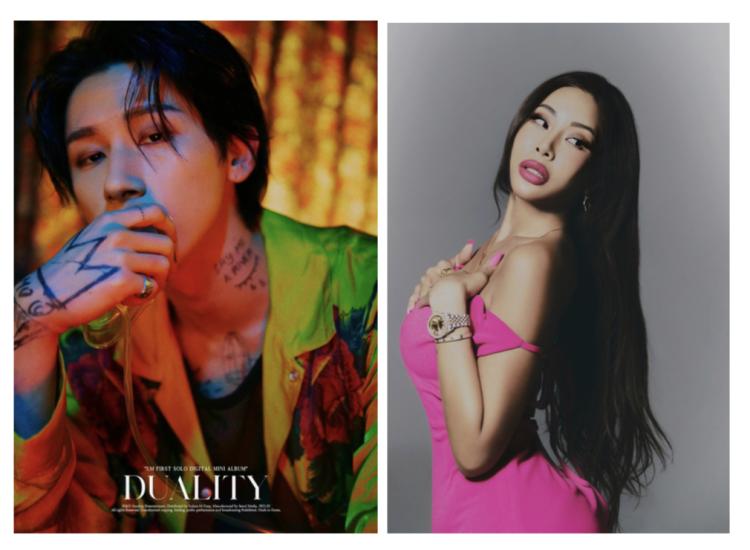Author: Phoebe Ham
Advisor: Prof. Kira Hall, TA Forest Stuart
Class: LING 1000: Language in US Society
Semester: Fall 2022
LURA 2023
In recent years, the popularity of Korean pop sensations such as BTS and BLACKPINK has blown up and expanded well past the continent from which they originated, taking over streaming services, award shows, and more. As more and more k-pop groups appeal to Western audiences and seek out global acknowledgment, foreign fans, especially in the United States, find themselves unable to ignore this versatile genre of music. However, a large number of newer fans and “locals”–people who are not proclaimed fans of said groups–are unaware of the racist past attributed to many Korean artists working within this genre of music.
K-pop idols such as Im Changkyun of Monsta X (known by his stage name I.M) and Jessi Ho (known as Jessi) are two examples of Korean American k-pop entertainers whose work I studied for this LING 1000 project, as pictured in the photographs below.

I.M was born in South Korea but moved to Boston, Massachusetts, where he spent most of his early life before moving back to South Korea. As one of the lyricists and producers for the group, he writes most of his own raps, many of which are littered with misused and out of place features of what linguists call AAVE (African American Vernacular English). It can be assumed that I.M includes AAVE phrases like “Fantastic, that’s me ‘cause I slay,” “Yo, I go loco… check my flow,” “... no cap, cap (no cap),” and “I ain’t got no limit” in the songs “FANTASIA” and “Rush Hour” to attempt to fit into African American hip hop culture. Many Korean rappers find inspiration in this genre, even going so far as to mimic their style as well as their language.
Although I.M is not viewed as an offender in the area of cultural appropriation, Jessi has been accused of blackfishing throughout her entire musical career. Jessi was born in New York City and raised in New Jersey, and in interviews with other Korean-American idols she retains a classic Jersey accent. It can be presumed that this is her natural way of speaking. For instance, in the pronunciation of certain words, such as “sauce,” she fully embraces said Jersey accent and accentuates the medial vowel sound so that the standard pronunciation /sɑs/ (in IPA transcription) sounds more like /sɔːs/. This is a common trait of New Jersey accents. However, in a video with the FO Squad, all of whom are African American, she speaks differently, with what some call a “blaccent.” She starts using AAVE terms more frequently, such as “bish” instead of “bitch” and “ya” instead of “you.” This is reminiscent of the vocabulary she uses in her songs, as heard in “Cold Blooded” and “ZOOM.” In these songs she frequently uses slang that originated in African American culture alongside syntactic features identified for AAVE, such as the double negative and zero copula. She also makes strong use of what sociolinguists call /aɪ/ monophthongization, common to both Southern and AAVE accents, so that words like “right” sound more like “raht.”
Interestingly enough, although I.M was born in Boston, he retains little to no signs of a classic Boston accent. According to Wolfram and Schilling, the unmistakable Boston accent was “established by emigrants” originally from Southeastern England (Wolfram and Schilling, 2016, pp. 28). A classic Boston accent includes certain pronunciations and elongation of vowels, as well as the elimination of consonants depending on the exact word. In an interview with Zach Sang from late 2021, Sang questions I.M on his unique accent, which surprisingly has no discernible nods to his childhood dialect. I.M lacks the dropping of the postvocalic [r] that originated from the initial rhotic British-English dialects, and instead sounds more ‘Australian,’ as stated by Sang. Interestingly enough, Boston is not particularly known for having a large African-American community, and AAVE features are not included in the classic Boston accent. This brings up the question of where he discovered AAVE: Why does I.M choose to use AAVE in his songs when he did not grow up in an AAVE-speaking community? To clarify, both I.M and Ho codeswitch between standard English and AAVE to an extent, depending on whether they’re on or off stage. However, while I.M’s speaking voice retains no hints of the frequent (mis)use of AAVE that he uses in his performing voice, Ho’s does the opposite. Ho uses terms that originated in AAVE in her every day speech, though it seems to heighten even more when she is around African American individuals, such as in the video with the Fo Squad.
Though I.M and Ho are not the only offenders of misusing AAVE in their music, they are two of the most obvious examples. Other idols that are fluent in English, such as Bang Chan of Stray Kids, Huh Yunjin of LE SSERAFIM, and Yoon Keeho of P1Harmony are also well-known in terms of their use of AAVE and cultural appropriation. Linguistically, it seems that multiple American English-speaking k-pop idols raised in the United States seem to be comfortable with the insensitivity that comes with cultural appropriation, much more than those who were born and raised in the non-English speaking country of Korea. However, this difference could also point towards the popularization of AAVE terms in Generation Z vocabulary, as younger idols of the newest k-pop generation are often seen as quirky and relatable because of their use of AAVE.
The roots of linguistic cultural appropriation and disrespect in k-pop go all the way back to the beginnings of the music genre. Their hold on newer generations of k-pop idols has only deepened in recent years. Although it is debatable whether or not the linguistic choices of these idols is offensive, it is undeniable that the language practices identified in this blog perpetuate deep ties to stereotypes of African-American English, both within the genre and the k-pop industry itself.
Image credit
https://www.youtube.com/watch?v=AQ0tR4RXMHY
References
-
Wolfram, W., & Schilling, N. (2016). Why Dialects? In American English: Dialects and
Variation (3rd ed., pp. 27–34). John Wiley and Sons, Inc.
-
Zach Sang Show. (2021, December 15). Monsta X Talks The Dreaming Album & Movie, Success, Recording In Different Languages & More! -->. YouTube. https://www.youtube.com/watch?v=UTw_nkADesg
-
Labov, W. (2006). 13. The Social Stratification of (r) in New York City Department Stores. In The Social Stratification of English in New York City (pp. 168–179). essay, Cambridge University Press.
-
Irwin, P., & Nagy, N. (2007, October). University of Pennsylvania Working Papers in Linguistics. Penn Libraries. Retrieved December 5, 2022, from https://repository.upenn.edu/cgi/viewcontent.cgi?article=1009&context=pwpl
-
DIVE Studios / 다이브 스튜디오. (2020b, September 9). Catching Up: Jessi (제시) (FULL Episode) I KPDB Ep. #73 -->. YouTube. https://www.youtube.com/watch?v=uB8Gzw9wSwg
-
Lippi-Green, R., Barrett, R., Cramer, J., & McGowan, K. B. (2023). English With An Accent: Language, Ideology and Discrimination in the United States. Routledge.

 Phoebe Ham is a current freshman at CU Boulder majoring in Linguistics and following the TESOL pathway. She is also minoring in English Literature and Education. She likes learning new languages, iced coffee, and writing.
Phoebe Ham is a current freshman at CU Boulder majoring in Linguistics and following the TESOL pathway. She is also minoring in English Literature and Education. She likes learning new languages, iced coffee, and writing.